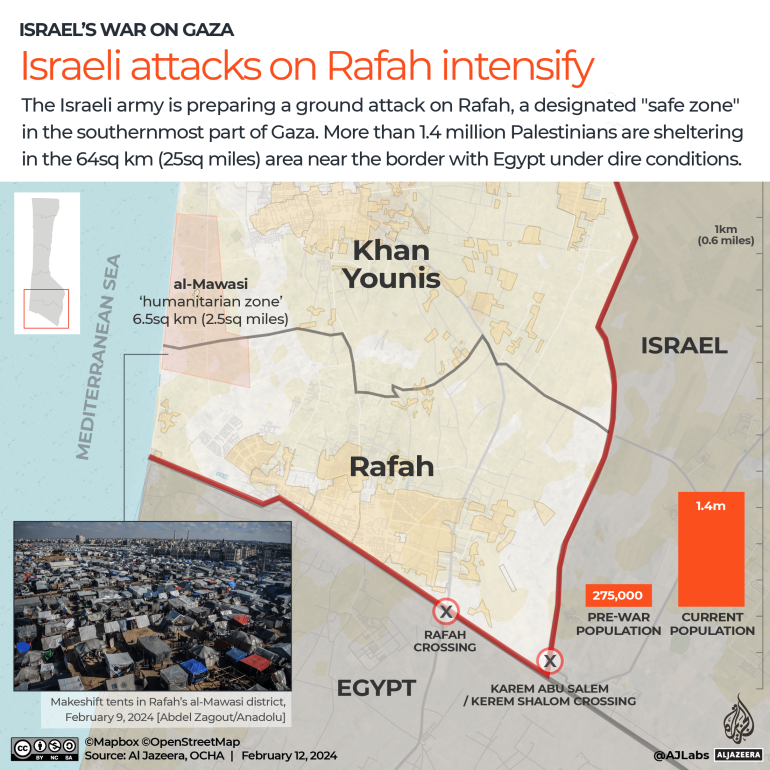The Israeli army appears set to launch its long-threatened assault on Rafah as it instructs Palestinians to leave parts of the city in southern Gaza.
Israeli forces called on Monday for people in Rafah, into which huge numbers of displaced Palestinians were previously pushed, to evacuate to “an expanded humanitarian area”. The move came as Israeli officials blamed Hamas for a breakdown in truce negotiations.
The Israeli military said in social media posts that it “encourages” residents in eastern Rafah to move to an area in al-Mawasi refugee camp, located by the Mediterranean west of Khan Younis.
The army said calls to “temporarily” relocate would be “conveyed through flyers, SMS messages, phone calls and media broadcasts in Arabic”.
“[Israeli forces] will continue pursuing Hamas everywhere in Gaza until all the hostages that they are holding in captivity are back home,” it said.
In a post on X, Israeli army spokesperson Avichay Adraee specified the appeal was to all people in the ash-Shoka area in the neighbourhoods of as-Salam, Janina, Tabet Ziraa and al-Byouk.
An Israeli military spokesperson told journalists about 100,000 people were being evacuated.
No refuge
Despite urgent warnings of a humanitarian disaster from his country’s allies, including the United States, Israeli Prime Minister Benjamin Netanyahu has insisted for weeks that an assault on Rafah must happen.
Israel says the city is a refuge for Hamas command and fighters who must be exterminated as part of Netanyahu’s pledge to deliver “total victory” over the Palestinian group.
However, NGOs on the ground warn that there is no refuge for the huge numbers of people in Rafah. Displaced people were previously pushed into the city by Israeli attacks on other areas of Gaza, and the city’s population is estimated to have swollen to around 1.4 million. Where those people might find safety from a military offensive is unclear.
The UN Agency for Palestine Refugees (UNRWA) warned in a social media post that an Israeli offensive would inflict more suffering and death on a Palestinian population that the health authorities say has killed more than 34,000 since October.
An Israeli offensive in #Rafah would mean more civilian suffering & deaths. The consequences would be devastating for 1.4 million people@UNRWA is not evacuating: the Agency will maintain a presence in Rafah as long as possible & will continue providing lifesaving aid to people pic.twitter.com/8anQ8Eq6Gv
— UNRWA (@UNRWA) May 6, 2024
Senior Hamas official Sami Abu Zuhri told Reuters that Israel’s Rafah evacuation order ahead of an expected offensive is a “dangerous escalation that will have consequences”.
Belgium warned that the evacuation and announced invasion will lead to a “massacre”.
“The Israeli call for the evacuation of the citizens and refugees of Rafah, and the announced invasion, will lead to massacre,” Deputy Prime Minister Petra De Sutter said on X. “Belgium is working on further sanctions against (Israel).”
The evacuation order followed a night of intense Israeli bombardment that killed 22 people, including eight children, in the city.
Al Jazeera’s Hani Mahmoud, reporting from Rafah, noted that the order came “in the aftermath of the Hamas attack on the Karem Abu Salem crossing, known in Hebrew as Kerem Shalom, and an intense Israeli response, in which they carried out 11 air raids, targeting areas in the eastern parts of Rafah city.
“It’s important to point out that so far all the evacuation zones designated by the Israeli military have not been safe for the displaced families. In fact, these areas have been constantly under attack, whether in western Khan Younis or here in Rafah, where 1.5 million people are sheltering,” he said.

Deadlocked
Israeli Defence Minister Yoav Gallant said in a statement that a military operation in Rafah is required due to Hamas’s refusals of mediated proposals for a Gaza truce under which it would free some captives.
A Hamas official said the group’s negotiating delegation was headed to Doha for “consultations” after the latest round of talks in Cairo failed to produce an agreement.
CIA director Bill Burns is expected in Qatar on Monday for “emergency” talks on mediation efforts with Prime Minister Sheikh Mohammed bin Abdulrahman bin Jassim Al Thani, a source told the AFP news agency.
Hamas negotiators have maintained their stance that any agreement must include a permanent end to the war inside the enclave, Palestinian officials said.
Israel has refused a full ceasefire, offering instead a pause in fighting to allow a prisoner swap. Netanyahu is under increasing pressure to secure the release of about 130 captives remaining in Gaza. However, he is also being pushed by hardline coalition partners to continue the war.
Al Jazeera’s Tareq Abu Azzoum, reporting from Rafah, said there had been “a great sense of optimism” in the last couple of days among Palestinians regarding negotiations in Cairo between Hamas and Israel.
“But that has dwindled following media reports about the same sticking points between Hamas and Israel,” he said.